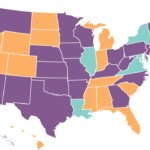Across America, millions of people living with rheumatic disease are finding it increasingly difficult to afford their treatments and access specialized healthcare. That’s why the American College of Rheumatology and its Simple Tasks public awareness campaign have released a first-of-its-kind Rheumatic Disease Report Card. The report card seeks to answer the question: “How easy is it to live with rheumatic disease in my state?”
“The goal is to both inform and empower the public and policymakers to address key healthcare access, affordability and lifestyle issues that impact quality of life for the millions of Americans who live with a doctor-diagnosed rheumatic disease,” says Kelly Weselman, MD, FACR, RMSK, RhMSUS, chair of the ACR’s Communications and Marketing Committee and a rheumatologist with Wellstar Rheumatology, Smyrna, Ga. “With approximately 25% of the U.S. population living with a rheumatic disease, we need to prioritize issues that are limiting the medical care of patients. We cannot afford to ignore this.”
Grading Rheumatology Care
The report card, launched as part of Rheumatic Disease Awareness Month (RDAM), was created by an interdisciplinary ACR task force comprising practicing rheumatologists from the College’s committees on Communications and Marketing, Government Affairs and Rheumatology Care. Task force members, including Dr. Weselman, were responsible for determining the report card grading indicators, methodology and weighting, and key messages.
The report card assigns grades to individual states according to their progress on three important aspects of care:
- Providing adequate access to rheumatology care;
- Ensuring rheumatic disease care is affordable; and
- Encouraging healthy lifestyle habits that ease the burden of rheumatic disease.
Maryland was the only state to receive an A, based on high marks in all three categories. The report notes that opportunity exists for the state to increase its affordability score by taking such measures as strengthening its Pharmacy Benefit Manager transparency laws to help make care more affordable.
Alabama and Oklahoma have the most room for improvement; both received a D overall.
The majority of states received a C, including Dr. Weselman’s home state of Georgia. Although her state was given high marks in the activity category because it has several CDC-funded arthritis intervention programs, Georgia has an opportunity to improve its access score by expanding health insurance coverage to more people.
“These state grades provide a clearer view of the challenges our patients and providers are experiencing and identify overall that there is a lot of work needed to improve the quality of life for Americans living with rheumatic diseases,” Dr. Weselman says. “Turning the tide on this public health crisis will require patients, physicians and policymakers working together to address the access, affordability and lifestyle factors that can help patients living with pain and disability live a better, healthier life.”

